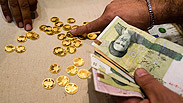
"The recent advances created new breathing room for the (Iranian) government," say economists. The Wall Street Journal reported on Thursday that there is an increase in optimism in the Islamic Republic, which is working under the assumption that the sanctions will end in a few years - a sentiment that helps stabilize the weakened Rial, the Iranian currency, and stop price hikes.
Rocky Ansari, a Tehran-based economist and financial consultant, told the Journal that the Iranian economy's recovery may depend on sanctions removal, but there is no doubt that there is a relief in the market that benefits the government of President Hassan Rouhani.
The International Monetary Fund (IMF) projected on Wednesday that the Iranian economy will grow by up to 2% for the fiscal year 2014-2015. This is in contrast to the 2% contraction estimated for the current fiscal year that ends in March. The IMF also projects a 15-20% fall in inflation in Iran in the coming year, in contrast to a record 45% inflation last summer.
Local business owners in Shiraz, a trade and tourism hub that was badly hurt by the international sanctions, expressed optimism and confidence in the Rouhani government's ability to gradually improve the situation. Their hopes are bolstered by the implementation of an interim agreement signed between Tehran and world powers in November. As part of the agreement, $550 million of Iran's frozen assets were released two weeks ago, with more to be unfrozen in the future.
US: Iran is not open for business
American officials have been warning businessmen worldwide that sanctions on oil, finance and banking in Iran remain in effect and US President Barack Obama warned potential sanctions violators on Tuesday, saying the United States "will come down on them like a ton of bricks."
US Undersecretary for Terrorism and Financing David Cohen, who is in charge of sanctions implementation, said in a Senate hearing last week that the financial relief Iran has received as a part of the first stage of the agreement is minor, and can be stopped immediately.
"As part of this effort, over the last six weeks I have traveled to the UK, Germany, Italy, Austria, Turkey and the United Arab Emirates carrying this message: 'Iran is not open for business,'" Cohen told skeptical lawmakers. "In all of these engagements we have made clear that we will continue to respond to Iran's efforts to evade our sanctions wherever they may occur ... We are poised to deploy our tools against anyone, anywhere, who violates our sanctions, just as we have always done."
"Sanctions will continue hitting Iran for the next six months while negotiations continue," Cohen added.
Prime Minister Benjamin Netanyahu also stated that "it would be a historic mistake to give Iran sanctions relief without it dismantling its nuclear capabilities."
"Iran is currently on the ropes and sanctions need to be enacted to their full effect," Netanyahu added.
However, not all in the world are heeding Washington's warnings, including some of the United States' allies. French Finance Minister Pierre Moscovici said his country anticipates significant financial opportunities with Iran if the sanctions imposed on it are removed. At the same time, however, he stated that Tehran must first prove its commitment to the nuclear agreement.
Moscovici spoke as over 100 French businessmen landed in Tehran to meet with trade officials and explore business opportunities between the two countries. This raised eyebrows in the US, and Secretary of State John Kerry even called his French counterpart Laurent Fabius to convey his concern of the French businessmen's visit to the Islamic Republic.
The topic was also raised this week in a joint press conference that Obama and French President Francois Hollande held at the White House earlier this week. Hollande stressed to reporters that businessmen are not government employees and Paris cannot, therefore, limit their every move. "But they know that they cannot violate the sanctions," he added.
Nonetheless, economists say that even after the sanctions are completely removed, it would be years before the Iranian economy is fully restored to its prior state. Until then, inflation will stay around 20%.
Iranian Supreme Leader Ayatollah Ali Khamenei also worked to lower expectations recently, telling Iranian Air Force officers that even though the interim agreement brought on temporary sanctions relief, it does not mean the country is on the road to financial recovery.















